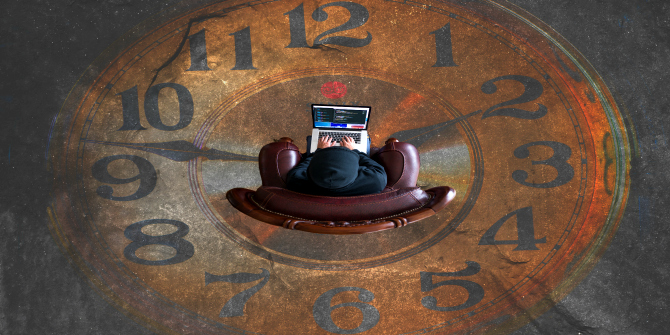 Amidst fears of a mental health crisis in higher education, to what extent is the peer review process a contributing factor? It’s a process fraught with uncertainty, as authors try to forge something constructive from often mixed feedback or occasionally downright unhelpful comments. Helen Kara stresses the importance of being aware of the effects of uncertainty and taking steps to reduce its impact. Focus on what you can control, prepare for different outcomes, acknowledge how you’re feeling, and make sure to practise self-care.
Amidst fears of a mental health crisis in higher education, to what extent is the peer review process a contributing factor? It’s a process fraught with uncertainty, as authors try to forge something constructive from often mixed feedback or occasionally downright unhelpful comments. Helen Kara stresses the importance of being aware of the effects of uncertainty and taking steps to reduce its impact. Focus on what you can control, prepare for different outcomes, acknowledge how you’re feeling, and make sure to practise self-care.
I am currently waiting for peer reviews of two books I’ve worked on: one sole-authored, one co-authored. We don’t talk much about the experience of waiting for reviews, and it’s not something that appears to have been researched. Yet it’s something everyone doing academic work has to go through and it may be bad for our mental health.
I’m finding it particularly difficult at the moment because a lot rides on these reviews. The sole-authored book, which is on a contentious topic, has already had one set of reviews. Reviewer 1 was utterly damning, saying “I couldn’t find anything to praise”. Luckily, Reviewers 2 and 3 were more measured, offering both praise and constructive criticism, and their input helped me to revise and strengthen the typescript. However, in the process, my editor and I realised that we needed further reviews from people with a particular kind of specialist knowledge. My editor approached around ten potential reviewers, but only one agreed to do the job. So I’m gibbering – what if that person agrees with Reviewer 1?
The co-authored book is in a contentious format. My co-authors and I decided that I would be the person to liaise with publishers, as I have form in this process. The last time I liaised with academic publishers for a co-authored book was in the early 2000s, and I’d forgotten how heavily responsible it makes me feel. Fortunately, I’ve found a publisher that is interested and has sent the book out for reviews, to two professional academics and two students. This is great – and terrifying – but at least there are four reviewers. Even so, what if they all think it’s rubbish?
In many ways I love the peer review system. I welcome feedback on my writing, and I’m not at all averse to constructive criticism. I am by no means arrogant enough to think I can write a good book without input from others. Yet peer review, as a process, is fraught with uncertainty. Comments may not be constructive, or may not come at all. They may be positive, or negative, or in between, or a mixture.
There is a body of research which demonstrates that uncertainty has a detrimental effect on mental health. Luckily for me, my mental health is fairly robust right now, so I can use this period of uncertainty as an opportunity to build further resilience. But what about those who aren’t so fortunate? We’re hearing a lot about the mental health crisis in higher education, but nobody seems to be talking about the potential contribution of the peer review system to this crisis. Given the evidence of links between uncertainty and mental health, it seems likely that there may be a relationship here.
I’m not arguing that we should tear down the peer review system and replace it with something completely different. Time spent waiting for reviews also has a positive effect, in that it creates necessary distance between the author and their work, meaning sensible revisions are easier to make. But I do think we need to be aware of the effects of uncertainty and take steps to reduce its impact on us. Here are four ideas.
- Aspects of life fall into three categories: those you can control, those you may be able to influence, and those you can neither control nor influence. Spend most of your energies on the first, some on the second, and none on the third. So I will spend my energies on hard work and good fun, and with any luck I won’t have much energy left for fruitless worry about the outcome of the peer reviews.
- Plan for different outcomes. Plans for positive reviews are easy, plans for negative reviews more challenging. For me, the worst-case scenario is that the publisher decides not to publish after all, which would mean – for either book – several years of work down the pan. However, that is unlikely, and if it does happen I/we can revise and submit again elsewhere.
- Acknowledge how you’re feeling. Writing this blog post is one way for me to acknowledge my own difficult feelings about this waiting period. In professional UK society the culture is not to talk about feelings much, if at all; if anyone asks how you are, the standard answers to give include “I’m fine”, or (with an eyeroll) “snowed under”. It’s as if we’re not allowed to give a real answer to the question. Yet suppressing our emotions is also bad for our mental health, so let’s talk about the difficulty of waiting, being in limbo, for unpredictable peer reviews.
- Practise self-care. All the usual stuff: eat sensibly, take exercise, get enough sleep – or, if you can’t sleep, rest your body quietly in a dark room and try to still your mind. There are some good video soundtracks and podcasts online to help you sleep. Work can be part of self-care when it’s work you enjoy and you don’t do too much. Spending time with loved ones is definitely part of self-care.
The peer review system can also be hard on reviewers, such as by asking more of people who are already too busy, and offering only intangible rewards. Saying “yes” to a review request adds an extra burden of work, saying “no” comes with an extra burden of guilt. Some people deal with this by deciding how many reviews they will undertake, such as 12 in a year, or three per draft article or book they themselves submit. That’s a great example of focusing on what you can control.
If you’re waiting for reviews yourself, the wait will be over, sooner or later. I hope you will be able to use the advice in this post to help make the process a little easier – as I intend to do myself. I wish you luck.
This blog post originally appeared on the author’s personal blog and is reposted here with permission.
Featured image credit: Tim Gouw, via Unsplash (licensed under a CC0 1.0 license).
Note: This article gives the views of the author, and not the position of the LSE Impact Blog, nor of the London School of Economics. Please review our comments policy if you have any concerns on posting a comment below.
About the author
Helen Kara has been an independent researcher since 1999, focusing on social care and health, partnership working and the third sector. She teaches and writes on research methods. Her most recent full-length book is Creative Research Methods in the Social Sciences: A Practical Guide (Policy, 2015), reviewed on LSE Review of Books, and she is also the author of the PhD Knowledge series of short e-books for doctoral students. Helen is a Visiting Fellow at the National Centre for Research Methods, and a Fellow of the Academy of Social Sciences.








Agreed with your statement ‘It is bad for our mental health’. It would be better if we find a better alternative to this.
Thanks for sharing this with me. Really truly said.
I recall a tweet from an editor at Duke University Press (Kris Wissowker?) pointing out that if a press has sent your manuscript out for review, they have already made a substantial commitment to the book and the odds are heavily in favour of publishing. The editor at the press may even help you figure out how to respond to the reviewer comments to make that happen.
This seems relevant in relation to the example of one that is going out for FURTHER review despite one damning review from the first round. If the press was going to kill this project, they would have done that by now. It sounds more like they want to figure out how to make it the best book it can be and are seeking expert peer feedback to do that.
The process is still nerve wracking. And yes, uncertainty is a huge contributor to stress and built into the system. However, seeing the process as weighted towards editorial input to improve the project rather than primarily being about yes/no decisions might help a little with what the uncertainty is really about.
This blog nicely addresses the problem of how reviews can be stressful and affect mental health. For the author, it can be more difficult because they are associated with the results. Here, these reviews will decide if the book gets published, so waiting for results becomes more stressful for you; the only solution is to stop thinking about things you can’t control and prepare yourself for different outcomes.I came across this page recently; it could offer some insights..
https://yourmentalhealthpal.com/safer-internet-day-online-mental-health/